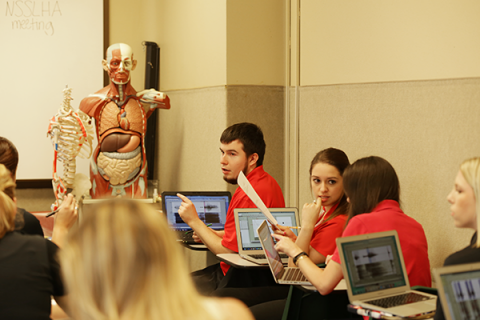5 Reasons Our Applied Language & Speech Program is One of the Best
We are proud that our communicative disorders PhD program is considered one of the best of its kind in the country. This national recognition is a direct result of a lot of hard work by our faculty and graduate students, and we’re excited about the promising future of communicative disorders graduate study at UL Lafayette.
So why is our Applied Language and Speech Sciences PhD program considered one of the best, you ask? Here’s why:
1. We’re ranked in the top 100 speech pathology programs in the country by U.S. News and World Report. 
So don’t just take our word for it!
2. We’re just the right size.
Our communicative disorders graduate programs are big enough to provide all the resources you could ever want or need, and yet small enough for you to get the individual attention and mentoring you deserve.
We admit about 35 students to the master’s in speech language pathology program each year, and we have about 25 students total in the Applied Language and Speech Sciences PhD program. Our students have come to know and expect the personal attention our faculty members are excited to provide, helping you to conduct research, build a solid academic foundation, and administer therapy in the clinic.
3. Our faculty are internationally recognized experts and our alumni are making major contributions to the field.
Our academic faculty have produced hundreds of publications about their research in communicative disorders. Dr. John Tetnowski is an international leader in stuttering and fluency disorder research, and Doris B. Hawthorne Eminent Scholar in Communicative Disorders. Dr. Jack Damico is also internationally recognized for his work with neurological disorders in adults and literacy and language problems. Our former and current PhD students are often co-authors on research publications with faculty members, as well.
Two recent graduates, Dr. Jamie Hartwell-Azios and Dr. Brent Archer, are assistant professors at two other universities but continue to collaborate on aphasia research. They recently presented their research at the 2017 Clinical Aphasiology Conference, which is only open to attendees who have their research accepted.
Dr. Evra Gunhan-Senol, another recent graduate, is now teaching at Medipol University in Istanbul, Turkey. She studied with Dr. Jack Damico and her dissertation was about services available for children with autism and the attitudes of their parents and the medical community.
4. We have an intensive focus on research—but equally important is our emphasis on applying that research to improve people’s lives.
The real life application of our research to help individuals is one of the most important reasons we have such a strong PhD in applied language and speech sciences program.
In the communicative disorder graduate programs, our students explore their own research through the Doris B. Hawthorne Center for Communicative Disorders & Special Education and the University of Louisiana at Lafayette Speech Language and Hearing Center.
In the Speech Language and Hearing Center, our students assess and provide intervention techniques for children and adults. It provides opportunities for our communicative disorder PhD students to conduct and apply their research while our students in our master’s in communicative disorder program gain valuable experience under the supervision of certified speech language pathologists.
Our PhD students in Applied Language and Speech Sciences also conduct research alongside faculty in the Hawthorne Center for Communicative Disorders & Special Education. They work with clients in the Speech Language and Hearing Center to design techniques and strategies to overcome the largest barriers to communication. Our professors and communicative disorder PhD students also travel to conferences around the world to present their research, and their evidence-based assessment and intervention techniques have been published in a range of professional journals.
Research in the communicative disorder doctoral program is a hands-on experience for everyone involved, and it translates into better results for our clients here and for others struggling with communicative disorders across the world. We want those that need it the most others to benefit from our research.
5. We do mentoring and collaboration right.
We don’t foster a competitive environment—we believe everyone benefits the most when we all collaborate and share ideas.
This holds true in both the classroom and the Speech Language and Hearing Clinic, where students and faculty collaborate on in-depth summer projects covering stuttering, language and literacy, aphasia, social communication, voice science, and augmentative and alternative communication.
Our communicative disorders PhD students have broad access to our professors and are encouraged to look to these scholars for guidance and mentorship while conducting research for their dissertation. Our faculty are also highly-active members of the local community, working in off-site settings such as hospitals, clinics, and schools to conduct research and to assist students and the community at large to provide improved therapy techniques.
